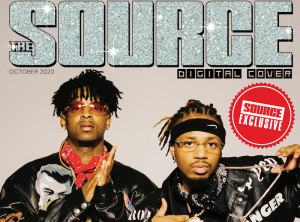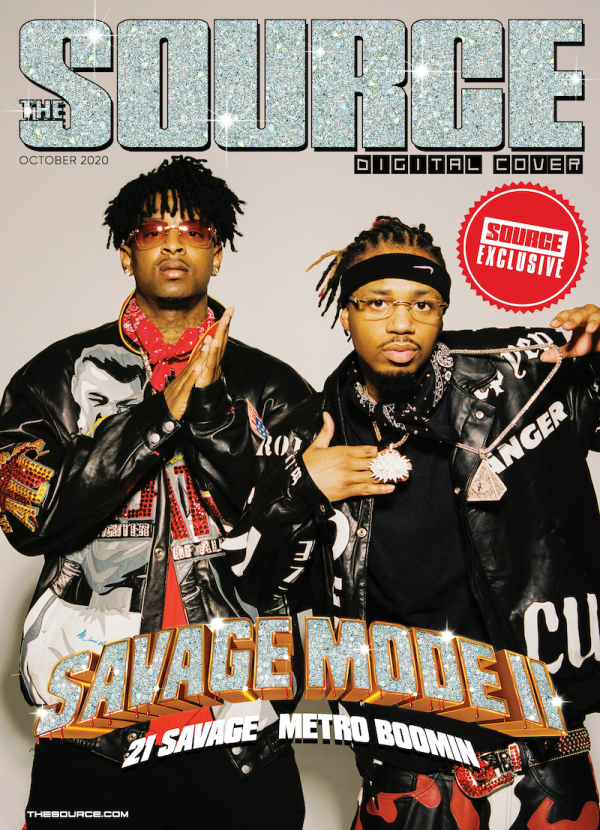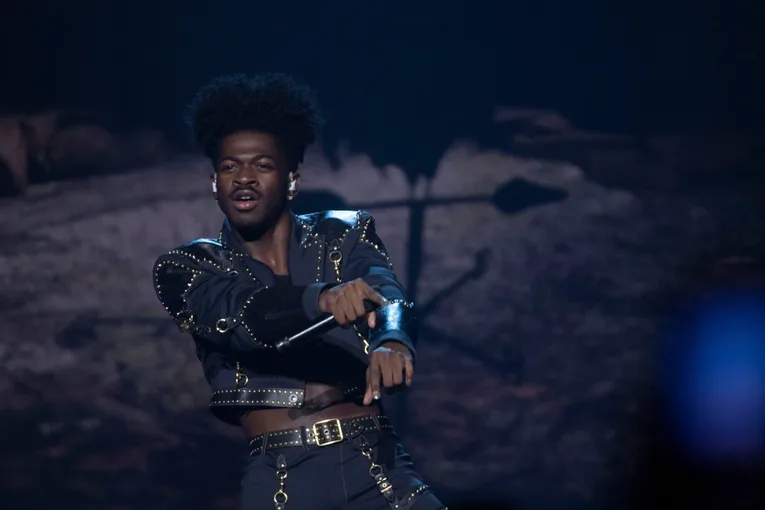News
Exclusive: 21 Savage and Metro Boomin Talk Creating ‘Savage Mode II’ in The SOURCE Digital Cover Story

The summer of 2016 didn’t see what was coming for it. After a spring where the good guys and commercial titans of Hip-Hop appeared to have placed their stamp on the forthcoming summer, Atlanta’s annual breakthrough star was coming with force. With Metro Boomin by his side, 21 Savage brought his gritty, dark, and intense view of the trap in Savage Mode. The reality of Savage’s lyrics coupled with the dark and transcendent production of Boomin created the new street symphony, songs that evoked no smiles, while each bar was the bridge between the listener and the rising star’s reality.

Throughout Savage Mode, the stories and demeanor depicted by 21 Savage are ferocious. The EP is a perfect marriage of his everyday life and mentality with Metro’s menacing score. While Savage Mode was weighted and aggressive, the rawness made it attractive. The talent in both men was undeniable and the music itself resonated in every circle, including those neither man likely aimed for. Savage Mode became critically acclaimed, launching 21 Savage into the national and eventual global forefront while continuing to prove that Metro Boomin was a generational talent. Savage Mode spawned two platinum singles: “X,” a flex on your old bae, bringing in Atlanta’s go-to hitmaker and Boomin’s What a Time to Be Alive collaborator Future, and “No Heart,” the album’s hardest-hitting single that put 21’s flow-flipping ability on display. By the conclusion of track nine, “Ocean Drive,” a star was born and a young legend was cemented.
Coming into Savage Mode, 21 Savage was up next. Those in and following the Atlanta scene knew it was only a matter of time once his 2015 run of Slaughter King, Free Guwop, and The Slaughter Tape became staples in the area. Savage Mode was the introduction for the masses, kidnapping everyone’s ears. What followed its release was what dreams were made of. In 2017, Savage would release his debut album, Issa, powered by the massive single “Bank Account.” With a star shining bright, 21 Savage became a force on features, his most successful pairing him alongside Post Malone for “Rockstar,” landing Savage at the top of the Billboard Hot 100 for the first time. The high-profile looks would continue as he found himself deliver a stellar feature to Cardi B’s “Bartier Cardi.” Savage would launch into another solo effort and sidestep the sophomore slump in I Am > I Was. The album would grant 21 Savage his first GRAMMY win after he showed he could rap alongside J. Cole’s feature hot streak on “a lot.”
With success unfortunately came trouble. On 2019’s Super Bowl Sunday, Savage couldn’t enjoy the success of “a lot,” as he was taken into custody by ICE as they allege he was unlawfully in the states, an event that put the government at the forefront of Hip-Hop as they attempted to tear him down. The efforts were futile and 21 Savage would continue to show another side of himself in supporting the Atlanta area through various initiatives including the annual “Issa Back to School Drive” and also utilized his hit “Bank Account” single to promote the 21 Savage Bank Account Campaign. Both efforts aim toward impacting the youth of the inner city, a population that is often underserved or entirely ignored.
The road coming in and out of Savage Mode was different for Metro Boomin. The St. Louis native has long had an ear for crafting the hottest sounds in rap and his 19 & Boomin release wasn’t a knock on the door, it was kicking it in and letting the game know it was his time. Boomin would go on to align himself with the hottest names you could find in Young Thug, Gucci Mane, and Future. Boomin eventually found himself as the executive producer of the classic collaborative effort, What a Time to Be Alive, pairing Future and the hottest artist on the planet Drake. The joint effort, which just turned five last month, placed Boomin at the center of Hip-Hop at just 22-years old but also showed that there are few, if any, who possess the talent to sway an entire genre as he does.
Metro Boomin became the go-to, the zenith, an instant legend. If your single opened with his “If Young Metro don’t trust you I’m gon’ shoot you” producer tag, you had Hip-Hop’s instant stamp. The star was so bright, records so massive, aura so rarified for a producer, his retirement announcement in April 2018 caught both fans and the industry by surprise. Rumors and fans pointed to reasons, including issues with his label, but his November comeback album, Not All Heroes Wear Capes, ironically doubled as a rise to the call of the moment. Hip-Hop needs Metro Boomin.
Savage and Boomin would reunite a year after Savage Mode, bringing in Offset for the collaborative album, Without Warning. The album took the Kobe and Shaq dynamic of the two and expanded into a Big Three as it was Offset’s first venture outside of the Atlanta chart-topping group Migos. With Boomin once again at the helm of the bangers, 21 Savage and Offset proved they could bounce off each other well. Not lost in the effort was the Savage Mode chemistry of the Savage-Boomin duo poking through on “My Choppa Hate Niggas” and “Run Up the Racks,” often recalling the magic created a year before. Then in May 2020 it happened, 21 Savage revealed he and Metro would be coming back with a sequel to their classic.
“Savage Mode 2 on the way,” 21 Savage told fans on Instagram. “You know I gotta perfect my shit. This shit take time. I be putting a lot of hard work into my shit. I ain’t finna drop anything. My shit gotta be hard. So it’s gonna take me a little bit longer. We working. I got a lot of other shit going on in my life, too, that I gotta balance, make all this shit work. But I promise you I’m working. It’s finna drop. I promise, it’s on the way.”
Following that message, fans would catch small tastes of the album in social media clips, however, an official update had not yet materialized. A product of today’s society, fans aimed to take the power into their own hands. On September 16, Boomin’s 27th birthday, a Change.org petition hit online urging for the release of the album. At the moment there were little to no details of what was created by the two. “Tired of 21 & Metro cappin,” the petition read, stating the project was needed as soon as possible.
Less than two weeks later, the duo delivered an announcement. In a Gibson Hazard-directed trailer, Savage and Boomin announced the forthcoming release with the help of iconic actor Morgan Freeman. “Savage is defined as fierce, beastly and untamed,” Freeman opened. “Mode is defined as a way of operating or using the system. So to be in Savage Mode is to go hard not allowing anything to stop or deter you from your mission.”
Freeman adds, “Basically when someone is in Savage Mode, they are not to be fucked with.” What better way to reintroduce the duo Hip-Hop fell in love with, in 2016?
The new album is 15 songs in length and brings in Drake, Young Nudy, and Young Thug for the festivities.
Four years after the first Savage Mode, 21 Savage and Metro Boomin’ join The Source to reflect on their first classic, the roads they both have traveled to this moment, and their visions when creating Savage Mode II.
21 Savage, The Slaughter Tape, Slaughter King, Free Guwop all had you buzzing. But the first Savage Mode was the global moment for you. Looking back, did you know the reception would turn out that way?
21 Savage: I knew it was gonna be a big deal but I ain’t know it was going to be a classic that folks still listen to now like it just came out.
Here we are four years later, both of you have registered a ton of success, what let you know it was time to make a sequel?
21 Savage: It was always was something we wanted to do but the timing was always important to us. Wasn’t no need to rush when we both had major projects coming out these past few years. After Metro dropped Not All Heroes Wear Capes and I dropped my last project it was just perfect timing to lock-in.
Metro Boomin: When we finished the first one we both agreed that we would have to eventually put out a sequel someday. After enough time to breathe and sit back, we felt like now was the time to come with volume two.
Was there any concern in releasing Savage Mode II in the pandemic with limited touring? A majority of the country not able to hear records in certain settings?
21 Savage: We aren’t driven off shows. We care about folks really listening to our music in all settings. If it’s an arena, your car, or living room, the quality will always cut through if we are on the road or not.
Metro Boomin: While there was concern about not being able to tour and connect with fans, most of the concern was people not being able to hear and live with the music in the appropriate settings. Dropping R&B albums and stay at home music can work and still thrive right now because that’s the ideal setting for that. But due to stay at home orders and social distancing, I was worried that people couldn’t experience the album as intended. The kind of music that me and Savage make together is mostly for when you are out living life. At the club or party with your friends, in the car, or just most places that aren’t in your home. When you listen to new albums that you love you tie certain experiences and events with them. We weren’t too pressed about you remembering this album as the time you were stuck at home with no toilet paper.
Is there pressure in creating a sequel? There was a fan petition to get this album released. Do you feel that with the status the first carries there is a level that must be met?
Metro Boomin: I feel with every new album there is a level that has to be met and that’s a level over the last one. As long as we get better every time then we’re good. There was for sure a certain amount of pressure with the first one being considered a cult classic and everything, but that’s the motivation and the fire at the same time.
21 Savage: I feel like it’s no pressure for us because when we made the first project we didn’t master our craft. It was raw and that’s what made it classic. Now it’s still raw but we both are one thousand times better version of ourselves in 2016.
Both of your lives have changed drastically since the first Savage Mode. For 21, how do you blend current life experiences with the themes and content of the first EP? For Metro, sounds evolve seemingly with you as the trendsetter, what did you want to make sure this effort had in production?
21 Savage: The first project I rapped about money, the streets, relationships, and loyalty. All of those things are still a big part of what I go through every day still but I just honestly have a bigger perspective on those topics. It helps the music honestly.
Metro Boomin: For me, it was fresh sounds and hard drums.
21, in between I am > I was and the release of this how have you changed musically?
21 Savage: I just care more about my craft. I don’t like just throwing music out, I never have, but especially now, I want my music to stick. A lot of artists just throwing music out and the fans forget about it a week later, so focusing on making quality is something that I focus hard on.
Metro, you have influenced so much of hip-hop culture and still a few years away from 30, what do you think is next for you to prove?
Metro Boomin: That I’m going to continue to keep growing and going up as my career goes on but at the same time keep integrity for the art.
At one point you announced your retirement. The rumor mill pointed toward label issues, but here you are again changing the game. What altered that perspective for you?
Metro Boomin: I never heard about label issues or had any but by the end of 2017 I had done so much at one time and just wanted to sit back and sharpen my knives. Gotta take time off and stay in the gym and at the same time keep from over-saturating things. I come in seasons.
21, your brand as a rapper has expanded in recent years. Collaborations with Avion, partnerships to promote financial literacy with Chime, each move is done with purpose, what drives your decision making?
21 Savage: The key is growth. What I learn I want to go back and teach the people where I’m from that might not understand financial literacy. All business partnerships are just me wanting to do things I like to do anyway so it does not feel forced. I’m making sure I make choices that my kids can eat from.
The post Exclusive: 21 Savage and Metro Boomin Talk Creating ‘Savage Mode II’ in The SOURCE Digital Cover Story appeared first on The Source.
Artist Spotlight
Phlo-osophy shares a new single, “Scientist Mind (Living My Life)”

Phlo-osophy’s “Scientist Mind (Living My Life)” is a thoughtful and relaxing meditation on intellect and existence, packaged with laid-back production that encourages both thought and comfort. The song starts with atmospheric synths and a low-key beat, creating a space that is the laboratory of contemplation.
Phlo-osophy’s lyrical style steers into tough concepts spontaneous physics of thought, the chemistry of emotion — and yet remains highly accessible. The production is the strength of the production: soft, warm textures, synth pads, muted guitar echoes, quiet electronic pulses, cohere into a hushed, private atmosphere.
The result is a song that teeters between heady curiosity and soulful expression. It’s not out to swamp us with complexity, but to suggest a room in which mind and emotion can cohabitate thoughtfully. “Scientist Mind (Living My Life)” serves as a signal of Phlo-osophy’s approach as an enlightening artist who writes not only with heart, but with mind and who welcomes the listener on its journey of self-discovery.
News
Police Scanner Audio Suggests Lil Nas X May Have Been Tased During Bizarre Studio City Arrest

Last week, an unexpected and surprising situation unfolded involving rapper Lil Nas X. Reports from police audio shared by TMZ reveal a dramatic scene where the Grammy-winning artist was allegedly found walking naked near Universal Studios. This led to police being called to intervene. According to the recordings, things escalated quickly, with indications that officers may have used a taser as Lil Nas ran towards them. As a result of this incident, Nas spent the weekend in jail and appeared in court on Monday, where he pleaded not guilty.
He was later released after paying $75,000 in bail. The details from the police recordings provide a rare glimpse into this intense moment that led to his arrest. Sharing a more personal view, Nas’ father, Robert Stafford, spoke to TMZ, reporting that his son is doing well. “He’s great. God is good, God has a plan. I think you all know everything that you need to know about what happened Thursday,” Stafford stated, showing his faith and support. He reassured fans that Nas is feeling remorseful about the incident, but emphasized that challenges can happen to any family.
He added that Nas is getting the help he needs and encouraged everyone to keep him in their thoughts and prayers. This unfolding story has gained a lot of attention, partly because it provides insight into a part of celebrity life that people don’t usually see. While news often focuses on the finished stories, these police recordings show events as they actually happened, making the situation feel more real and striking. As the legal process continues, many are watching to see what will happen next for Nas, both in his personal life and career.
The police audio serves as a strong reminder of how quickly life can take unexpected turns, even for well-known figures in music. With the support of his family and a focus on moving forward, Nas seems ready to handle this challenging time with responsibility and dignity. This unusual incident highlights the human side of celebrity news, reminding fans that there’s always more to a story than what’s seen in the headlines.
-

 Artist Spotlight7 days ago
Artist Spotlight7 days agoG3 the Plug moves like a ghost on latest release “Danny Phantom”
-

 Artist Spotlight7 days ago
Artist Spotlight7 days agoXirux delivers a raw valentine’s confession with latest release “Street Love”
-

 Artist Spotlight7 days ago
Artist Spotlight7 days agoEylsia Nicolas’s quiet thank you that echoes loudly on new single “Never Stop Loving You”
-

 Artist Spotlight7 days ago
Artist Spotlight7 days agoKate Neckel’s intimacy in sound captured in one take on latest release “Awake”
-

 Artist Spotlight7 days ago
Artist Spotlight7 days agoAlex Krawczyk’s gentle maps for the long way through on latest release “When The Road Is Uneven”
-

 Artist Spotlight3 days ago
Artist Spotlight3 days agoGOODTWIN shares reflection with indie-pop single, “Soak It Up”
-

 Artist Spotlight7 days ago
Artist Spotlight7 days agoHeron’s heart first and head last on latest release “Fell In Love Again”
-

 Artist Spotlight18 hours ago
Artist Spotlight18 hours agoMORPHEUS VON DOBENHAUSEN lets go of the chaos, dancing steady soft and slow in latest release “GOODBYE CHAOS”


